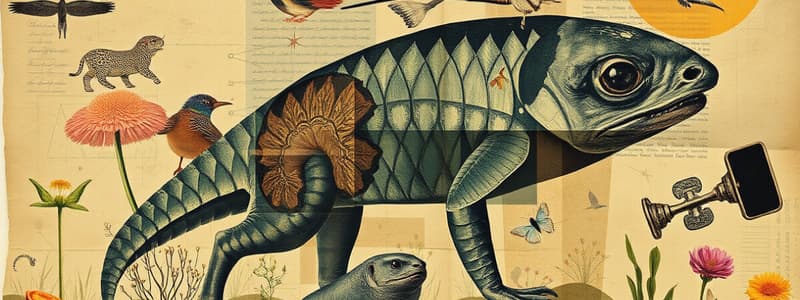Podcast
Questions and Answers
What is the primary concern expressed by the author in the letter?
What is the primary concern expressed by the author in the letter?
- Lack of proper scientific tools for examination.
- Challenges in maintaining the museum’s collection.
- Doubts about the authenticity of the specimen. (correct)
- Confusion over the classification of a new specimen. (correct)
Which features does the author attribute to the creature they received?
Which features does the author attribute to the creature they received?
- Scaly skin and large teeth.
- Hairy body and sharp claws.
- Flat tail and vibrant feathers.
- Sleek body, flat tail, and webbed feet. (correct)
How does the author initially react to the specimen?
How does the author initially react to the specimen?
- With excitement and curiosity.
- With joy and disbelief.
- With irritation and skepticism. (correct)
- With indifference and apathy.
What conclusion does the author come to about the specimen after further examination?
What conclusion does the author come to about the specimen after further examination?
What role does the author hold at the museum?
What role does the author hold at the museum?
What uncertainty does the author express regarding the classification of the creature?
What uncertainty does the author express regarding the classification of the creature?
What concern does the author raise about established classifications?
What concern does the author raise about established classifications?
Which phrase indicates the author's desire for a timely response?
Which phrase indicates the author's desire for a timely response?
What does the author imply about his understanding of the creature?
What does the author imply about his understanding of the creature?
What is the overall tone of the letter written by George Shaw?
What is the overall tone of the letter written by George Shaw?
Flashcards are hidden until you start studying
Study Notes
Overview of the Letter
- Written by George Shaw to a respected colleague, expressing confusion over a curious specimen.
- The specimen arrived from New South Wales, Australia, noted as an extraordinary find.
Description of the Specimen
- The creature has features of multiple animals:
- Sleek, hairy body resembling an otter.
- Flat tail like a beaver.
- Webbed feet and bill similar to a duck.
- Initially suspected to be a hoax due to its bizarre appearance.
Scientific Classification Concerns
- Found no evidence indicating it was a manufactured creature, leading to the possibility of it being a unique species.
- Uncertainty over its classification under the Linnaean system which organizes living organisms based on shared characteristics.
- The specimen presents challenges as it displays characteristics of mammals and possibly birds, complicating taxonomic categorization.
Emotional Tone and Requests
- Shaw expresses irritation, confusion, and urgency, encouraging the recipient to provide thoughts on how to classify the specimen.
- The letter reflects a blend of scientific inquiry and faith in both God and science to understand the new find.
Vocabulary Insights
- Trivial: Refers to things that are not very important.
- Quandary: A state of perplexity or doubt.
- Trick: A deception or falsehood.
- Discredit: To cause disbelief in the accuracy or truth of something.
- Similar to ‘cruel’: A possible synonym is ‘fiendish.’
Specific Questions Addressed
- Package origin: New South Wales, Australia.
- Mammal feature: The presence of fur suggests it is a mammal.
- Unusual aspect: It combines features of multiple animal species, making it impossible to classify easily.
- Flattery: Shaw uses phrases like “esteemed colleague” and “fellow man of science” to gain favor and encourage response.
- Urgency in reply: Phrases such as “at the soonest opportunity” indicate Shaw’s desire for a quick response.
Studying That Suits You
Use AI to generate personalized quizzes and flashcards to suit your learning preferences.




